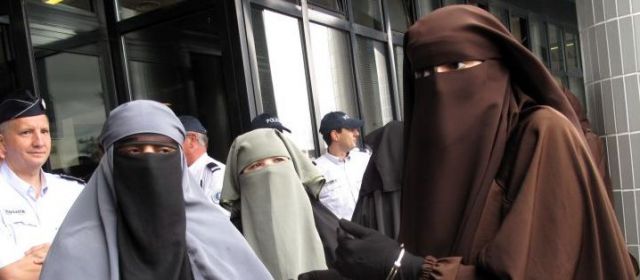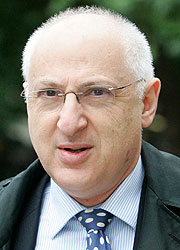ENGAGE replies to Unmesh Desai.
Category Archives: State Oppression
French court hears first case against women who refuse to accept veil ban

Hind (right) with supporters outside the court
A French court Thursday heard the country’s first case against women refusing to obey a new law banning the wearing of Islamic face veils in public.
The two women, who wear the niqab, were ordered to appear before the court in the town of Meaux, about 40 kilometres east of Paris, for going to the local town hall on May 5 with their faces veiled.
Both the women live in the Paris region. One of them could not be present at the hearing. The other woman, Hind, 31, a mother of a three-year-old, was barred from entering the courtroom after refusing to remove her veil for the duration of the hearing. “I accepted to undergo an identity check (by briefly showing her face). But they refused all compromise,” she told the German Press Agency dpa.
The two women were booked by police after showing up at Meaux town hall with a birthday cake for Mayor Jean-Francois Cope, who is also leader of President Nicolas Sarkozy’s conservative ruling Union for a Popular Majority (UMP). The cake was made of almonds, a word which sounds like the French word for fines (amendes), and was meant as a dig at the government over the timid application by the authorities of the two-month-old law.
While several women have been booked by police, only one has been fined so far, according to Rachid Nekkaz, founder of Don’t Touch My Constitution, a group lobbying against the ban.
Hind said she hoped to be fined, so that she could challenge the law, which she sees as an attack on her freedom of religion, in the European Court of Human Rights.
PREVENT 2011: towards informed responses
The Muslim Council of Britain is in the process of publishing a series of critical comments on the government’s revised counter-terrorism policy.
Nottingham University spies on students
 Confidential documents relating to a suspected Islamic bomb plot have revealed that security staff from a leading university have been secretly filming students on campus as a method of monitoring potential extremists.
Confidential documents relating to a suspected Islamic bomb plot have revealed that security staff from a leading university have been secretly filming students on campus as a method of monitoring potential extremists.
More than 200 university documents – along with material from the Met’s counter-terrorism command, Special Branch and the Crown Prosecution Service – detail the controversial techniques being deployed to monitor students.
The documents, published on the website Unileaks, follows the government’s publication of its Prevent -terrorism strategy, which is aimed at targeting radicalisation in universities but has sparked concerns that it could fuel Islamophobia.
The material charts the consequences of the May 2008 arrest by counter-terrorism officers of Nottingham student Rizwaan Sabir and of Hicham Yezza, who worked as an administrator at the university’s school of modern languages.
Sabir had downloaded an al-Qaida training manual as part of research for a dissertation, and had sought Yezza’s help in drafting a PhD proposal because of his position as editor of a political magazine. Although campaigners say the manual was available in the university’s own library and that versions are available from retailers Blackwell’s, Waterstone’s and Amazon, university officials alerted the police. Both men were released without charge six days later.
Even so, documents released under the Freedom of Information Act reveal that the arrests were mentioned in a report, cited by the Home Office, called Islamist Terrorist Plots in Great Britain: Uncovering the Global Network.
They also reveal how university security staff kept a log of Middle East-related activities on campus, including details of talks and seminars revolving around Palestine and other issues. Nottingham University admitted that it “routinely” filmed students who protest on campus, and recorded a demonstration last month in connection with the arrests.
Staff and students who spoke out in support of Yezza and Sabir were logged by a Whitehall counter-terrorism unit called the Research, Information and Communications Unit, which is embedded in the government’s Office for Security and Counter-Terrorism. Shami Chakrabarti, director of pressure group Liberty, said: “Is it right that universities are taking on policing duties?”
Last month, Nottingham University lecturer Dr Rod Thornton was suspended for writing an article criticising the university’s treatment of Sabir. In a paper prepared for the British International Studies Association, he alleged the university “refused to apologise to the men” and attempted to smear them. He wrote: “Untruth piled on untruth until a point was reached where the Home Office itself farcically came to advertise the case as a ‘major Islamist plot’.”
The university responded by suspending Thornton, who lectures on security issues and is a former infantryman who served in Northern Ireland. That prompted an international outcry in which 67 academics, including the renowned US scholar Noam Chomsky,demanded his “immediate reinstatement”. The group described the original arrests as “indicative of a growing tide of Islamophobia”.
Thornton, speaking after his ninth disciplinary hearing on Thursday, said: “It’s about academic freedom, but also the wider issue of the way Muslim students are treated. Suspicions are being raised when they should not be.”
French court bars Muslim woman from wearing headscarf, judge insults her faith
The Collectif contre l’islamophobie en France reports on the disgraceful treatment of a Muslim woman in Béziers who attended a court hearing over the custody of her child.
She was told by a police officer that that she would have to remove her headscarf out of respect for the judge, by order of the court, otherwise the hearing would take place in her absence. When she tried to enter the courtroom wearing a headband rather than a scarf she was barred by the clerk who told her “no, no, veils are prohibited” and made her remove the headband before she was allowed in.
During the hearing the judge told the woman that she was a “bad mother” because she had allowed her son to convert to Islam, which the judge described as “an act of barbarism towards children”, adding “don’t tell me that the Muslim religion is better than any other religion”. Despite the evidence that the child wanted to remain with his mother the judge stated that it was not for the child to “choose and lay down the law in this court”.
The CCIF has condemned the the court’s treatment of the young woman and has called on the minister of justice to take disciplinary action against the judge.
British couple challenge French veil ban
A Muslim husband and wife are using a British legal team to launch a landmark human rights challenge to the French ban on face-covering veils.
The couple are taking the French government to the European Court of Human Rights over its prohibition on wearing the niqab and burka in a case of importance across the European Union. They are seeking damages and a ruling that the ban on the full-face veil is “unnecessary, disproportionate and unlawful”. They also contend the blanket ban restricts their right to free movement across the EU.
The husband is a French national living with his wife and two children in the West Midlands. They are being represented by Robina Shah from the Birmingham-based Immigration Advisory Service, who has lodged their application with the human rights court in Strasbourg, and barrister Ramby de Mello.
Ms Shah said: “The case clearly is of importance to my clients. As a result of the ban they have had to leave their country of nationality, as the ban restricts their freedom of choice, and that of their daughters.”
The couple wish to remain anonymous, saying there is “considerable hostility” in both the UK and France to Muslim women who go fully veiled in public.
Court upholds Catalan city’s veil ban
A Spanish court has upheld a ban by a city on face-covering Islamic veils worn in municipal buildings.
In 2010, the city of Lleida became the first Spanish one to impose such a ban. But the Catalan regional Superior Justice Tribunal suspended it following an appeal by a Muslim association that claimed it violated basic rights.
The court ruled Wednesday that the northeastern city was within its rights to ban the clothing in municipal buildings for security and identification purposes. It also backed Lleida’s argument that the veils are discriminatory.
Other Spanish towns have taken similar steps but their burqa bans have yet to take effect.
Lleida’s one is largely symbolic since only about 3 percent of Lleida’s population is Muslim and very few wear face-covering garments.
Quilliam calls for Lord Carlile to be appointed counter-terror tsar
 Over at his Independent blog Ben Chu draws our attention to the interesting coincidence that Quilliam and Paul Goodman have simultaneously issued a call for Lord Carlile to be appointed overseer of the Prevent counter-terrorism strategy.
Over at his Independent blog Ben Chu draws our attention to the interesting coincidence that Quilliam and Paul Goodman have simultaneously issued a call for Lord Carlile to be appointed overseer of the Prevent counter-terrorism strategy.
Carlile is a Liberal Democrat, but he is notorious for rejecting his party’s line that defence against the threat of terrorism doesn’t justify attacks on civil liberties. As Chu points out, Carlile has been a vocal critic of the Lib Dems’ opposition to control orders. He has also condemned the European Court of Human Rights for ruling that terror suspects cannot be deported to their country of origin if they face torture there.
Chu observes that “Quilliam’s championing of the peer for the role of counter-terror tsar is not going to change the mind of those Muslims who regard the think tank with suspicion”.
Doctors asked to spot ‘patients at risk from Islamic radicalisation’
Doctors are to be drafted into the fight against terrorism by being asked to identify patients at risk of being drawn into violent extremism. The controversial move will be spelt out today by the Home Secretary, Theresa May, as she publishes the Government’s much-delayed strategy for combating extremism.
Plans to ask medical professionals to alert authorities about people vulnerable to radicalisation will alarm doctors’ groups, amid fears it could erode patient confidentiality.
See also the Daily Telegraph, 7 June 2011
The Guardian quotes a spokesperson for the British Medical Association as saying: “Doctors cannot look into the future and say how someone might behave. This would threaten the trust of the doctor and … patient relationship. A doctor’s role is to treat the patient in front of them, not predict how the patient will behave in future.”
Azad Ali exposes the flaws in Prevent
On this morning’s Radio 4 Today programme Azad Ali of the Muslim Safety Forum took on former security minister Baroness Neville-Jones in a discussion about the government’s review of the Prevent counter-terrorism strategy.
